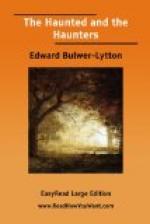“I am afraid I’ll never be allowed to bury the two bodies in the same hole,” said Teig, in his own mind. “You corpse, there on my back,” says he, “will you be satisfied if I bury you down here?” But the corpse never answered him a word.
“That’s a good sign,” said Teig to himself. “Maybe he’s getting quiet,” and he thrust the spade down in the earth again. Perhaps he hurt the flesh of the other body, for the dead man that was buried there stood up in the grave, and shouted an awful shout. “Hoo! hoo!! hoo!!! Go! go!! go!!! or you’re a dead, dead, dead man!” And then he fell back in the grave again. Teig said afterwards, that of all the wonderful things he saw that night, that was the most awful to him. His hair stood upright on his head like the bristles of a pig, the cold sweat ran off his face, and then came a tremour over all his bones, until he thought that he must fall.
But after a while he became bolder, when he saw that the second corpse remained lying quietly there, and he threw in the clay on it again, and he smoothed it overhead, and he laid down the flags carefully as they had been before. “It can’t be that he’ll rise up any more,” said he.
He went down the aisle a little further, and drew near to the door, and began raising the flags again, looking for another bed for the corpse on his back. He took up three or four flags and put them aside, and then he dug the clay. He was not long digging until he laid bare an old woman without a thread upon her but her shirt. She was more lively than the first corpse, for he had scarcely taken any of the clay away from about her, when she sat up and began to cry, “Ho, you bodach (clown)! Ha, you bodach! Where has he been that he got no bed?”
Poor Teig drew back, and when she found that she was getting no answer, she closed her eyes gently, lost her vigour, and fell back quietly and slowly under the clay. Teig did to her as he had done to the man—he threw the clay back on her, and left the flags down overhead.




